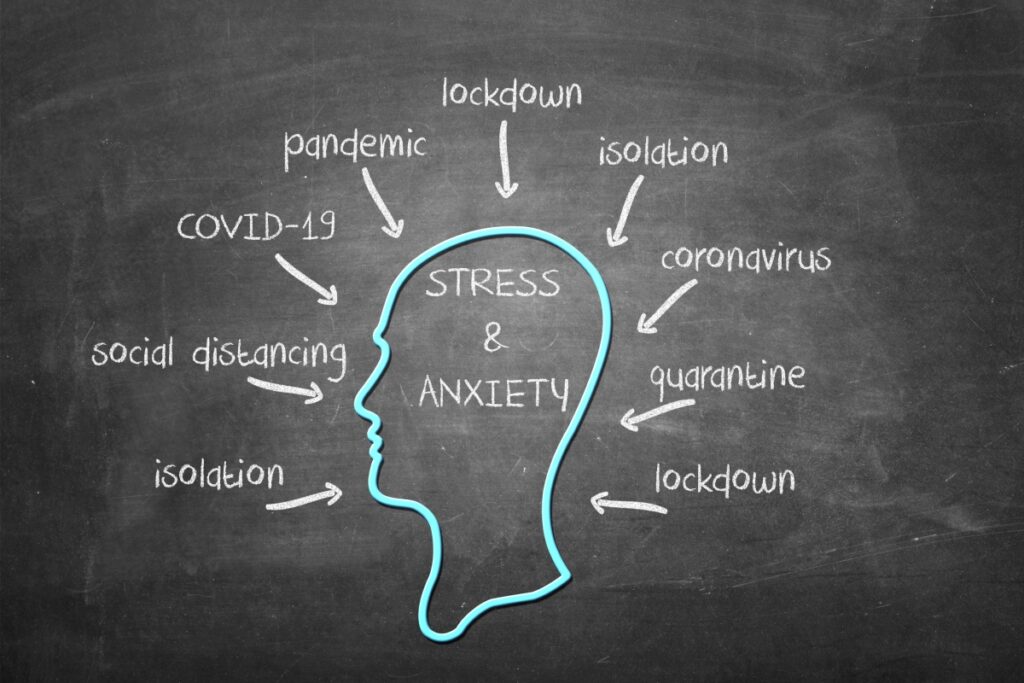Glutamate is the most abundant neurotransmitter in the brain. It plays various roles in the brain; you can find more information about glutamate and its functions in part 1 of this article.
If you have too much or too little glutamate in your brain, you can experience certain symptoms, which this article covers. These can interfere with your daily tasks and life in general. We will look at the 5 most common symptoms indicating whether you have a glutamate imbalance or not.
Glutamate imbalance is not a disease on its own, but it contributes to many mental health, neurological, and cognitive issues. One of the main causes of this is excess inflammation and oxidative stress, especially in the nervous system. Fortunately, there are many ways to support glutamate balance naturally. See part 3 of this article on how to optimize your glutamate balance. In this article, we’ll cover how to tell if you have too much or too little glutamate.

Symptoms of glutamate imbalances
Glutamate is important for normal brain and cognitive performance. If levels of this neurotransmitter fall below or above the optimal range, certain impairments and neurological dysfunctions can occur.
Symptoms of glutamate imbalances are:
- Inability to focus
- Insomnia
- Anxiety
- Brain fog
- Chronic pain
Inability to focus
Balanced levels of glutamate are key to maintaining sharp mental focus. Having too little or too much of this chemical messenger can affect an individual’s attention span.
All of us have had this problem at one time or another – the inability to focus on certain tasks or in general. Some nootropics can optimize levels of glutamate in the right parts of the brain; thus helping us to continue with our day and maximize our attention levels.
Insomnia
Another tell-tale sign of glutamate imbalance is insomnia (difficulty in sleeping). This chemical messenger participates in maintaining sleep and wakefulness.
Glutamate helps to regulate sleep through interaction with different neurons; meaning that there are different phases and circuits that need to be initiated to have a regular sleep cycle.
The reticular formation and the hypothalamus are brain regions that play a role in sleep and consciousness.
If there are low levels of glutamate in the pontine reticular formation and hypothalamus, interaction with other neurons will be low; this will contribute to insomnia.
Glutamate also regulates both REM sleep and wakefulness.
Anxiety
Glutamate is a precursor to GABA and they are usually in balance with each other. If glutamate is too high relative to GABA, it will cause anxiety and insomnia.
Usually, we associate serotonin, dopamine, or other neurotransmitters with anxiety. However, glutamate’s role in this is becoming better understood.
However, glutamate in the right places can decrease anxiety. In clinical trials, glutamatergic drugs have helped with obsessive-compulsive disorder, general anxiety disorders, and social phobia.
A glutamate imbalance can make you anxious. If you struggle with chronic anxiety, consider balancing glutamate and GABA in addition to serotonin and dopamine.

Brain fog
Brain fog is a vague term that refers to the inability to think clearly or recall effectively. Feeling fatigued and being unproductive can also be signs of brain fog – when the brain is not at its top game. It goes hand in hand with impaired memory, attention, and slow cognitive processing.
Brain fog can be a symptom of an imbalance of certain brain chemicals, specifically glutamate. Too much glutamate can lead to cell death and deprive the brain of antioxidants needed for maximum brain optimization.
This results in an inability to have sharp memory and focus. It can make you feel like you are not 100% “yourself”. Brain fog can be associated with different neurological disorders but a simple cause may be a glutamate imbalance.
Chronic pain
Glutamate plays a vital role in pain sensation and transmission. As such, it has a role in both acute and chronic pain processing. Acute pain is a useful warning signal in the body. However, if pain persists and becomes chronic, it is no longer useful and can be seen as a disease. It can lead to cognitive impairment and even anxiety and depression.
Too high glutamate levels can over-stimulate brain areas such as the amygdala and insula. It disrupts their functioning, leading to perceptions of chronic pain. Therefore, modulating glutamate receptors or lowering brain glutamate levels may help in the treatment of chronic pain.
I experience these symptoms, what to do next?
Inability to focus, insomnia, anxiety, brain fog, and chronic pain are all signs of having excess or low glutamate levels. Fortunately, it is possible to address the imbalances once you understand the root causes.
References
- Zhou Y, Danbolt NC. Glutamate as a neurotransmitter in the healthy brain. J Neural Transm (Vienna). 2014;121(8):799-817.
- Shi Y-F, Yu Y-Q. The roles of glutamate in sleep and wakefulness. Zhejiang Da Xue Xue Bao Yi Xue Ban. 2013;42(5):583-590.
- He S, Zhang X, Qu S. Glutamate, glutamate transporters, and circadian rhythm sleep disorders in neurodegenerative diseases. ACS Chem Neurosci. 2019;10(1):175-181.
- Faraguna U, Ferrucci M, Giorgi FS, Fornai F. Editorial: The functional anatomy of the reticular formation. Front Neuroanat. 2019;13:55.
- Bear MH, Reddy V, Bollu PC. Neuroanatomy, Hypothalamus. In: StatPearls. StatPearls Publishing; 2021.
- Watson CJ, Lydic R, Baghdoyan HA. Sleep duration varies as a function of glutamate and GABA in rat pontine reticular formation: Glutamate, GABA, and sleep episode duration. J Neurochem. 2011;118(4):571-580.
- John J, Ramanathan L, Siegel JM. Rapid changes in glutamate levels in the posterior hypothalamus across sleep-wake states in freely behaving rats. Am J Physiol Regul Integr Comp Physiol. 2008;295(6):R2041-9.
- Quora. These neurotransmitters are probably keeping you up at night. Forbes Magazine. Published online October 5, 2016. Accessed November 22, 2021. https://www.forbes.com/sites/quora/2016/10/05/these-neurotransmitters-are-probably-keeping-you-up-at-night/
- Cortese BM, Phan KL. The role of glutamate in anxiety and related disorders. CNS Spectr. 2005;10(10):820-830.
- Kraal AZ, Arvanitis NR, Jaeger AP, Ellingrod VL. Could dietary glutamate play a role in psychiatric distress? Neuropsychobiology. 2020;79(1):13-19.
- M J, Stachowicz K, Nowak G, Pilc A. The loss of glutamate-GABA Harmony in anxiety disorders. In: Kalinin V, ed. Anxiety Disorders. InTech; 2011.
- Kaplan G. Stop Eating These Foods And Clear Up Your Brain! Kaplanclinic.com. Accessed November 22, 2021. https://kaplanclinic.com/stop-eating-these-foods-and-clear-up-your-brain/
- Rascon G. What is Brain Fog? Symptoms & Treatment Options. Steadymd.com. Published July 16, 2019. Accessed November 22, 2021. https://www.steadymd.com/2019/07/16/brain-fog/
- Pereira V, Goudet C. Emerging trends in pain modulation by metabotropic glutamate receptors. Front Mol Neurosci. 2018;11:464.
- French A. Glutamate & Pain. Sfgate.com. Published April 22, 2013. Accessed November 22, 2021. https://healthyeating.sfgate.com/glutamate-pain-8891.html
